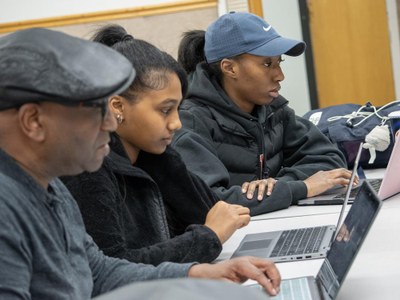
MAY 21, 2024
Image Credit: Rukayya Ibrahim, assistant professor of mathematical sciences, served as a faculty mentor for high school student Sarah Gebrezgi in the EnvironMentors program. Ibrahim said exposing the students to an institution of higher learning is great experience for them, especially if they’re going to college to possibly specialize in STEM. Credit: Sharon Siegfried / Penn State. Creative Commons
MIDDLETOWN, Pa. — Mane Khachatryan, a second-year biology major at Penn State Harrisburg, said she didn’t really get to delve into science until she came to college. So when she heard about EnvironMentors — a program that helps expose high school students to STEM — she jumped at the chance to help younger students explore the field.
“I wish I had opportunities like this in high school,” she said.
Many of the Penn State Harrisburg students and faculty who signed up to be mentors for high school students through the EnvironMentors program cite a common reason they wanted to participate — the chance to give high school students something they didn’t have themselves.
Penn State Harrisburg began participating in the Penn State chapter of EnvironMentors in 2019. The program links a high school student with an undergraduate student mentor and a faculty mentor for an environmentally themed research project that takes place over the course of the academic year.
While some of the high school students are already interested in STEM, the goal is to reach them early, said Mitch Spear, laboratory manager at Penn State Harrisburg and part of the EnvironMentors leadership team. Through the program, the students are introduced not only to STEM fields, but to college life as well.
<SNIP>
.The EnvironMentors experience culminates in a research symposium, which was held at University Park. That means that in addition to experience with research, the students get a taste of what it’s like to present in a professional setting.
Sarah said that expressing her research and sharing it with an audience was challenging.
“I had to break out of my shell as well,” she said.
Ariam added that the research symposium was a great opportunity to network with researchers throughout Penn State.
“I met and spoke with many professors that were conducting research like mine and ended up learning even more from their findings,” she said.
Rukayya Ibrahim, assistant professor of mathematical sciences, served as Sarah’s faculty mentor. Ibrahim said she’s passionate about outreach, and so, for her, signing up as a faculty mentor was a “no brainer.”
“I grew up … not being able to see someone like me in science,” she said. She added that exposing the students to an institution of higher learning is great experience for them, especially if they’re going to college to possibly specialize in STEM.
Greg Jenkins, professor of meteorology and atmospheric science at Penn State, served as Ariam’s mentor. He said high school students don’t often get the opportunity to do this type of research, much less on a university campus.
The program has benefits for the mentors, too, he said.
“We’re interested in the projects,” he said. “They’re helping us to push our projects forward.”
Read the full story on Penn State News.

